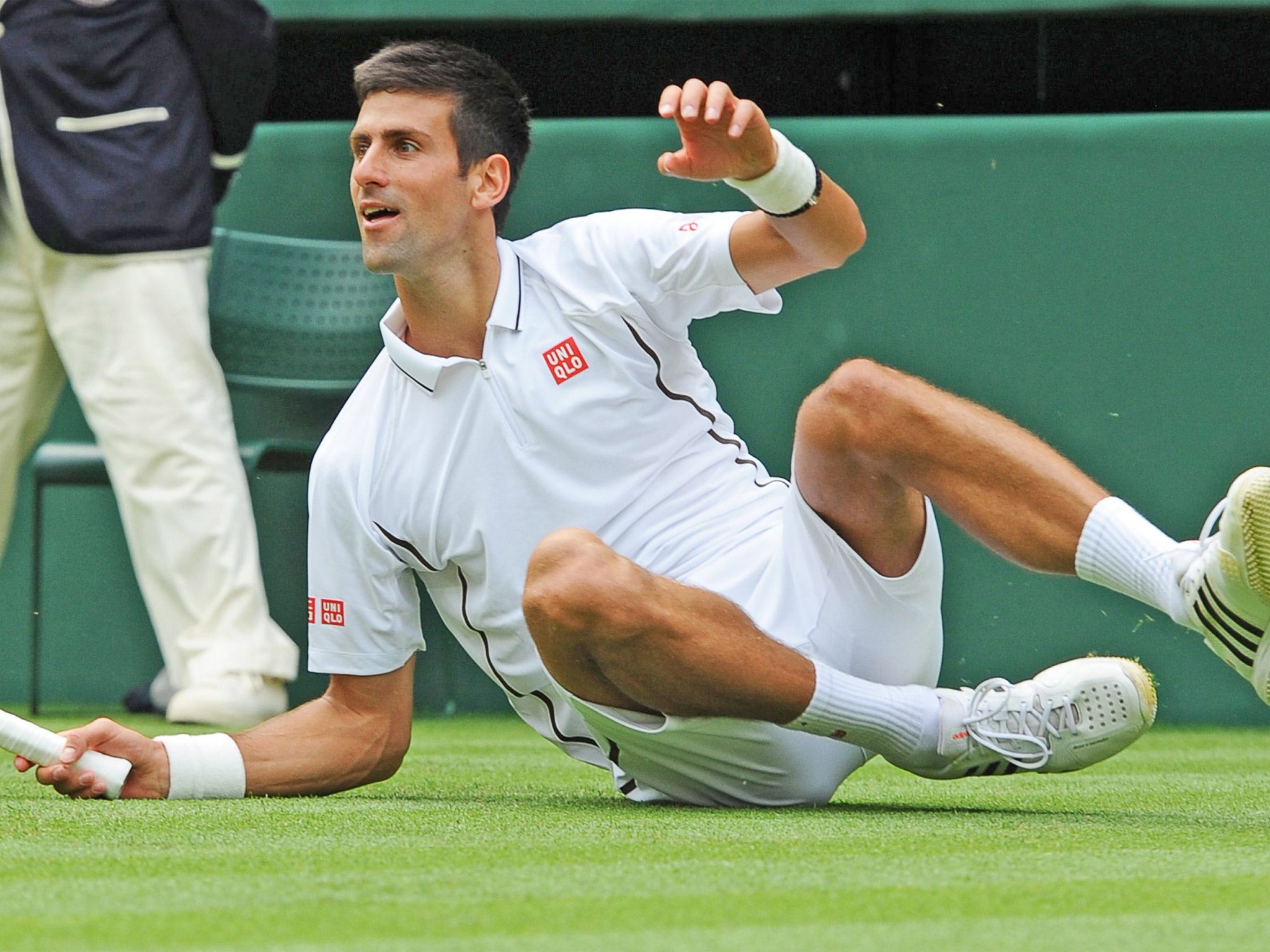James Lawton: Novak Djokovic inhabits a world beyond the reach of doubts
The world No 1 simply reached out for another level of performance

Maybe there was no easy way to reoccupy all that astonishing terrain left empty by the disappearance of Rafa Nadal but, if you had to pick a man for the job, who better than Novak Djokovic?
It is no disrespect to the venerable icon Roger Federer or the increasingly authentic challenger Andy Murray to say that he brought a unique aura to the Centre Court.
Rafa has to re-make himself once again after the shock of his defeat by the obscure Belgian Steve Darcis. Federer once more has to ransack the last of his resources in pursuit of his 18th Grand Slam title. Murray, for all the progress that now includes the US Open title and an Olympic gold medal, still has only one foot among the men who have shaped arguably the most compelling era the game has known.
It meant that there were moments in the bright sunshine when it was impossible not to believe that Djokovic suddenly held the whole of the game in the palm of one witheringly powerful hand.
Aged 26, the man from Serbia is neither advancing nor regressing. He is not thrusting for a new position, not fighting a slide. He simply inhabits the prime of his competitive life, this owner of six Grand Slam titles – it would have been seven and a full set if Nadal had not produced his astounding comeback in Paris a few weeks ago – and we saw precisely the force of both his current mood and a nature which has been ferocious since the cradle.
The day after Nadal fell, Djokovic near faultlessly eased himself back on to the Centre Court grass and afterwards he was quick to point out that the man he had beaten, the 29-year-old German Florian Mayer, could not be seen as just another piece of first round fodder routinely fed to the marquee names who command the huge television audiences in the second week of the great tournament.
Mayer, a Bavarian from the town of Bayreuth which famously celebrates the thunderous music of Richard Wanger, has certainly played a few boisterous tunes on his racket. He has twice made it to the Wimbledon quarter-finals, last year against Djokovic. He is currently ranked 34th in the world after reaching a career high of 18th.
One of the claims Mayer brought to the Centre Court was ownership of an elaborately deceitful drop shot and a startling back-lift on both the fore and backhand.
He was not a man to discount, Djokovic suggested, as you fought to make yourself at home again on the green grass of SW19. You do not, after all, stumble your way to career winnings of more than $4m. Mayer was a man to respect and, more pertinently, to destroy.
This Djokovic did with accelerating confidence over one hour and 56 minutes, winning eventually as a champion might toy with an utterly outmatched opponent. The score was 6-3, 7-5, 6-4, but the details do not begin to describe how it was when Djokovic decided it was time to move his game on to another dimension. The point was 5-5 in the second set, one which had followed a superb opening onslaught which had delivered the first set amid a fusillade of shots coming with increasing fluency.
Djokovic simply reached out for another level of performance just at that moment Mayer was beginning to wonder if he might walk in the steps of that unlikely destroyer of great players, Darcis.
It was the most fanciful of possibibilities, Djokovic insisted as he swept to the second set and then strolled through the third, picking his shots, savouring his moments, and always lifting his game when Mayer might have flirted with the idea of even the most fleeting of serious involvement.
Later he sounded rather as he looked, ultimately composed, endlessly in charge of the nuances of his latest challenge.
He said: "I felt pretty good because for the opening match of the grass court season it was a very satisfying performance. Even though I think I can play better, as I said it is normal to expect that you are still finding your rhythm and adjusting to a new surface and new movement.
"Knowing his quality, knowing that we played quarter-finals last season, gave me enough reason to not underestimate him and respect the fact that I need to be 100 per cent focused from the start and try to have control of the match. And it's what I've done. I've played well in important moments."
He had also come to his workplace utterly insulated from the turmoil that enveloped one of his great rivals just 24 hours earlier. Had he seen any relevance to his own position?
No, he had not. He said with a serenity that might have been chilling for anyone outside of his own arena. "Well," he said, "for me it didn't really signify anything much. You know we're playing a Grand Slam and I'm focussing on my own matches. To be honest I was expecting him to be a bit rusty on the court.
"It was normal for Rafa because he has played so many matches this year since he came back. The majority of those matches were on clay. So, obviously, it was very dangerous for him."
Some saw at least a glimmer of such a threat for the world's No 1 player. Then they went to the Centre Court and saw a man beyond any kind of doubt. If the mood holds for another week or so, Wimbledon had better brace itself for something quite sensational.
Subscribe to Independent Premium to bookmark this article
Want to bookmark your favourite articles and stories to read or reference later? Start your Independent Premium subscription today.

Join our commenting forum
Join thought-provoking conversations, follow other Independent readers and see their replies